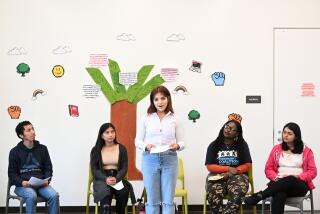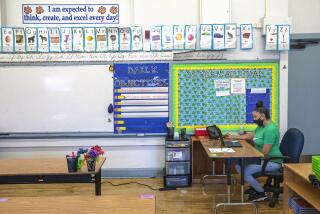Making Computers Part of Life
- Share via
Kevin Fox, a Grant High School junior, won a $10,000 college scholarship for writing an essay about the use of computers in the year 2000. He envisions a network, which he calls Hyperion, that would make customized software available on command and give all computer users instant communications with each other. Fox, 16, lives in Encino with his parents, David and Carolyn Fox.
I wasn’t interested in computers until I was about 8 or 9. But then I really got into it. I was really fascinated that you could type things into a machine and it would understand what you’re saying.
I was with maybe five or six other people, we had like a little computer lab. What I liked about it was that it was such a new area for education that they didn’t tell you what to do. They said, “This is a computer and we don’t really have any lesson plan, so just have at it.” You could do whatever you wanted to. Your ability was your own limit as to how far you could go with it.
I was sort of apathetic in school. Computers played a large part in showing me one area where I excelled. Since then I’ve liked the praise I got in that and I’ve been pushing myself in a lot of other areas. It’s really beneficial to my school career.
Computers are much more complex than anything that’s ever been made. And the more complex it is the more natural it seems. It’s sort of ironic. They make them more and more complex so that they seem more and more simple on the surface. I think that’s really going to progress in the future, it’s going to become more and more like a part of our life as opposed to something that’s strange.
I have a Macintosh Plus, but I’ve souped it up a whole lot. That makes me sound like a nerd. Well, I’ve expanded its capabilities. I have a larger hard disk. I gave it more RAM. I have a modem. I have a hard disk drive that has cartridges and each cartridge holds 45 megabytes. It’s exactly the same as a normal hard disk except whenever you run out of room you don’t have to buy another hard disk, you just get another cartridge, and it’s great.
I use the computer more often and I get a lot out of it. Right now I’m studying for a history test, and with my modem I can link up to a computer center called America on Line that has an on-line encyclopedia and like all the articles from Associated Press are on there. I can download all the stuff on the computer and I can print it out or manipulate it any way I want to.
It’s really beneficial in more ways than most people would generally think. It sort of gives me an edge over some other students, because they don’t have computers, and it certainly helps in school and basically, in everything else that I do.
In the future, computers are going to be a part of our everyday life. It’s like, nowadays you don’t think much when you go to the ATM machines and just put in your card and get money out of it. I think 15 or 20 years from now most people will have a computer in their house and it’s going to be part of our everyday life.
You’re not going to even think of it as a computer anymore. Maybe your refrigerator and oven will be incorporated into it as well. You can say, “Give me a cheese enchilada,” and it would just spit a cheese enchilada out of the dispenser slot. Who knows?
I think maybe by the year 2060 that you’ll no longer have a television set. What you’ll have is sort of like a terminal and you’ll use it like a television set, a computer, a video telephone and a fax. If you could integrate it all into one system I think that would be good.
2060, oh, yuck, I don’t like thinking of that. I’ll be 87 years old. I wish it would come sooner. That’s one thing I’m going to try to do with my life, I’m going to try to get these things to happen sooner because I’d like to work with them. It sounds kind of greedy, but it’s not any good if I’m not around to enjoy it.






